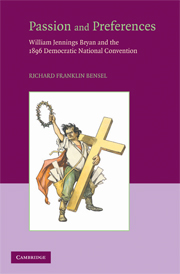2 - The Road to Chicago
Published online by Cambridge University Press: 24 July 2009
Summary
Writing on the eve of the convention, Senator David Hill of New York compared the conflict between gold and silver to the struggle over slavery just before the Civil War. “Extreme counsel” and the blunders of Democratic leaders in 1860 had produced “disaster, secession, and a bloody war,” and, as a result, the party had been kept “out of power for twenty-four years. Wise action could have prevented [that] disaster … coolness, courage, and diplomacy can now avert” catastrophe in Chicago. The senator then said that only compromise could now save the party. The “compromise” he described, however, was one in which the gold men would carry everything before them, including an endorsement of the gold standard in the national party platform.
Like most easterners who believed there was a chance – admittedly slim, but a chance nonetheless – that a rupture could be avoided, the senator placed his hopes in confidential negotiations with the more experienced and mature leaders of the silver forces. With respect to the rank and file silver men, the gold advocates had more or less given up. As Hill put it, there is “much wild talk about the corridors of the hotels that Eastern votes are not desired” for the Democratic ticket in November, but “discreet” silver leaders were discouraging “such unwise and silly utterances.”
Although the gold faction and their leaders fought on, the hard-money cause was, in fact, already hopeless.
- Type
- Chapter
- Information
- Passion and PreferencesWilliam Jennings Bryan and the 1896 Democratic Convention, pp. 24 - 45Publisher: Cambridge University PressPrint publication year: 2008



